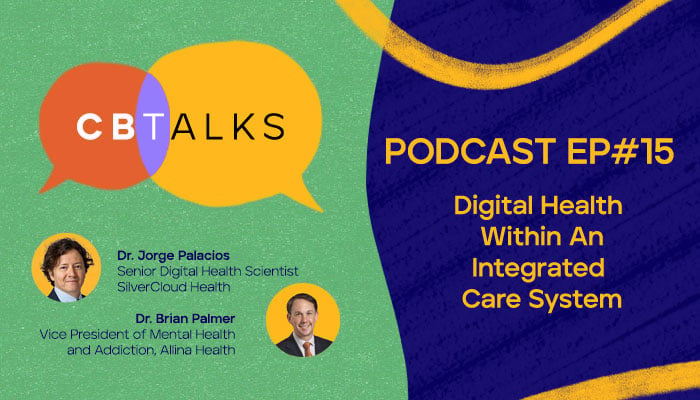
In this episode of our podcast, CBTalks, SilverCloud’s Senior Digital Health Scientist Dr. Jorge Palacios chats with Dr. Brian Palmer, Vice President of Mental Health and Addiction, Allina Health about how an integrated and coordinated care system combined with digital health can help to serve the growing needs of the community. Allina is a not-for-profit healthcare system that operates in the US states of Minnesota and Wisconsin. They have 11 hospitals, 90 clinics, and approx. 30,000 employees. Working closely with SilverCloud, Allina Health has provided a robust care delivery service and supports those using its systems.
Dr. Palmer describes how he was always drawn to the intersection between individual patient care and the systems that drive that patient care. Dr. Palacios asks Dr. Palmer what led him to choose digital care to be integrated within the Allina healthcare system. Dr. Palmer said many factors influenced this decision but Allina being at the front edge of driving value-based care where funding is directly impacted, and an access crisis primarily influenced this. Since they started offering SilverCloud over 1,000 patients have been prescribed the platform and this has enabled them to scale, increase access and drive value.
Dr. Palmer went on to describe how SilverCloud is integrated and delivered within the Allina health system. When choosing what mode of treatment to prescribe to a patient, the primary care provider considers all the individual factors such as patient preference and illness severity. Dr. Palmer admits digital treatments are not for everyone and therefore they rely on the primary care provider’s discernment and relationship with their patient to decide what mode of treatment suits them best. The programs for depression and anxiety are prescribed by primary care providers to people with mild to moderate symptoms and patients completing these programs are supported by a mental health coach.
Dr. Palacios then goes on to ask Dr. Palmer about the impact digital solutions have had. On patients, Dr. Palmer said many have said they feel like they’ve had traditional therapy and it really works for many people. In terms of the impact on supporters/coaches, he describes how they have a sense of helping facilitate someone’s growth that’s a different feeling from helping somebody in face-to-face therapy but is also deeply rewarding. Also, knowing that they can help a larger number of people, albeit in a slightly more distant way also gives them satisfaction. It’s also highly satisfying for their primary care providers to know that they have a treatment they can offer to someone right away. Dr. Palacios asks Dr. Palmer about the challenges he has encountered with regard to digital health. Pre-COVID he describes how digital healthcare was met with a lot of resistance and skepticism. However, COVID greatly accelerated receptivity to change and led to rapid transformation in mental healthcare delivery. Allina Health moved 94% of our practice to virtual in a 3-week period after 10 years of planning for the first virtual trial. It’s brought about rapid transformation and flexibility.
Finally, Dr. Palacios asked Dr. Palmer “If you could have an answer to something that you don’t know right now, what would you most like to know?”
“Dr. Palmer - If we were to deploy resources (the finite amount we have) here what’s the impact of that approach versus another approach? To be able to get real-time information about that to aid decision-making about how we grow programs, where we put programs, and how we serve that is the next phase we are looking to get to. Also, where is mental and addiction care delivery going and how do you build systems of care for a huge spectrum of mental health conditions. This is more from an implementation rather than a research point of view, but another important thing to know is How well we deliver what we know works and how we scale that?”
Listen to the full episode:







